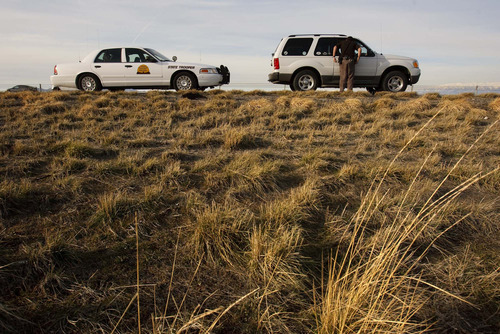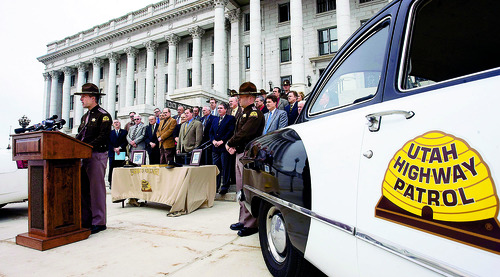This is an archived article that was published on sltrib.com in 2013, and information in the article may be outdated. It is provided only for personal research purposes and may not be reprinted.
Utah Highway Patrol Cpl. Shawn Alton says his 2011 request to search a man's SUV and trailer had the proper approval.
But court records show the Emery County attorney told Alton he didn't have enough probable cause to search Jeffrey Lawrence's vehicle two years ago on the side of Interstate 70.
Now it's Lawrence with a court order — to dig around into what UHP did to investigate Alton and the unlawful search.
Third District Judge L.A. Dever on Wednesday ordered the UHP to provide Lawrence with records of its investigation into Alton. The ruling, however, could have a broader impact.
Police departments in Utah generally regard their investigations into their own officers to be sacrosanct, except in those cases where criminal misconduct is found or the department disciplines the officer.
Attorney Jeffrey Hunt, who represents news outlets and follows rulings concerning Utah's records laws, said Dever's ruling may make more investigations of government employees available to the public.
"The judge has articulated a compelling public interest in learning about how the disciplinary process works when you have serious allegations such as this," Hunt said.
UHP still has the option of appealing Dever's ruling. Dwayne Baird, a spokesman for UHP, issued a statement.
"The Utah Highway Patrol leadership would like to take some time to review this ruling and discuss it with the commissioner of public safety before proceeding in this matter," the statement said.
Lawrence's case had already exposed a UHP policy unusual in law enforcement — a refusal to tell citizens what happened to their complaint. Now, after once being searched and subsequently charged with a crime, Lawrence said the ruling represents the legal process working for him.
"I do feel vindicated," Lawrence said Thursday. "I know I didn't do anything wrong. I know Trooper Alton did."
On the night of April 20, 2011, Lawrence, a Colorado resident, was driving to Las Vegas. He ran out of gas on Interstate 70 near Green River, Utah. Alton arrived and began questioning Lawrence, including asking if he had drugs, weapons or large amounts of cash, according to court records. Lawrence said no and denied Alton's request to search his Chevy Suburban and the cargo trailer he was towing.
Another trooper and a Emery County sheriff's deputy arrived. They and Alton continued questioning Lawrence, according to court papers, and eventually obtained the later-disputed warrant to search the SUV and trailer. They found 1 to 2 grams of marijuana and the pain reliever hydrocodone. Lawrence had prescriptions for both. But the Emery County Attorney's Office still charged Lawrence with a felony count of drug possession and three misdemeanors.
The charges were dismissed after the problems were discovered with the search warrant. Lawrence's attorney, Greg Stevens, said Alton claimed the electronic form he completed automatically filled in a section stating the prosecutor approved.
Lawrence filed a lawsuit in federal court and filed a formal citizen's complaint with UHP against Alton. UHP paid Lawrence $40,000 to settle the federal lawsuit. But as for Lawrence's complaint, UHP sent Lawrence a two-paragraph letter from Maj. Mike Rapich reading, in part: "Appropriate action has been taken to address the concerns outlined in your letter dated Sept. 17, 2011."
But Lawrence wanted to see UHP's investigation into Alton. He sent the Utah Department of Public Safety, UHP's parent agency, a request under the Utah Government Records Access and Management Act, the state's public records law. DPS denied Lawrence's request.
In an appeal hearing before the Utah Records Committee in October 2012, DPS attorney Lana Taylor said that since Alton was not disciplined, disclosing the records would be an invasion of his privacy. The records committee sided with DPS.
Lawrence appealed that decision by filing a lawsuit in 3rd District Court. In his ruling, Dever rejected the concerns about Alton's privacy.
"... there is no merit to DPS's argument that the interests favoring secrecy are not substantially outweighed by the public policies and interest favoring public disclosure," Dever wrote.
Dever also rejected an alternative from state attorneys to provide Lawrence with the records with an order preventing him from sharing the results. Dever said the public has an interest in learning how UHP handled the complaint.
The state also must pay Lawrence's legal fees. Stevens said those will be about $9,000.
Twitter: @natecarlisle





